中考英语常考句型总结 (3)
【中考英语总复习 必备知识】表达意见和建议的句型-中考英语复习必背句型(人教版)

表达意见和建议的句型一、陈述个人意见、看法的句型(1)I'm afraid...恐怕······例句①I'm afraid we can't finish it on time.恐怕我们不能按时完成.②I'm afraid I have to leave now.我恐怕现在得走了.③I'm afraid you are wrong.恐怕你错了.④There's little time left. I'm afraid we have to make a decision as soon as possible.时间所剩无几,恐怕我们得尽快作出决定了.⑤-What a strong sandstorm! Will it last long? 多么厉害的沙尘暴呀!它会持续很长时间吗?-I'm afraid so. We're getting into the sandstorm season now.恐怕是吧.我们现在已经进入沙尘暴较多的季节了.⑥-Can we be on time?我们能准时吗?-I'm afraid not.恐怕不能.(2)I think (that)...我认为······该句型用于说话者陈述自己对于某人或某事物的看法,强调的是个人主观意愿,与客观事实可能存在差异.that 是一个连接词,在句中引导宾语从句,可以省略.“I think(that)...”的否定形式为“I don't think(that)...”,意为“我认为······不”,表示主观的否定意见和看法. I think so意为“我认为如此”,I don't think so意为“我不这样认为”.例句①I think the volunteers who saved people in trouble should be regarded as heroes as well.我认为那些拯救受困人员的志愿者也应该被视为英雄.②I think(that)Tom is honest.我认为汤姆很诚实.③I think he will come to see us soon.我认为他不久就会来看我们.④I think that is a good idea.我认为那是一个不错的主意.⑤I don't think my parents will agree.我认为我的父母不会同意.⑥I don't think he will join us.我认为他不会加入我们.⑦-Are you sure you can do well in today's test, Lucy?露西,你确信你今天考试能考得不错吗?-I think so. I've got everything ready.我认为如此,我已经做好准备了.(3)I think/find/feel it+形容词+to do sth我认为/发现/感觉做某事······这一结构中,it为形式宾语,真正的宾语是后面的动词不定式.例句①I think it impolite to cut in line.我认为插队是不礼貌的.②I think it easy to make friends with Mr. White.我认为和怀特先生交朋友很容易.③I think it great to join in their party tonight.我认为今晚参加他们的聚会是非常棒的.④I find it easy to learn English well.我发现学好英语是很容易的.⑤I find it hard to teach my younger brother to paint.我发现教我弟弟画画不容易.⑥I feel it necessary to help the old.我感到帮助老人是必要的.⑦I feel it possible to finish my homework before nine o'clock.我觉得九点前完成作业是可能的.(4)I wonder...我想知道······例句①I wonder if/whether he will come.我想知道他是否会来.②I wonder if/whether the house is big enough.我想知道这房子是不是足够大.③I wonder who told him the seeret.我想知道谁把秘密告诉了他.④I wonder how James is getting on.我想知道詹姆斯的近况.⑤I wonder where he spent his childhood.我想知道他的童年是在哪里度过的.⑥I wonder which he chose at last.我想知道他最后选了哪个.(5)I hope...我希望······“I hope...”句型用来表达自己的愿望,后面可以跟动词不定式或that引导的宾语从句,that可以省略,从句的时态多用一般现在时或一般将来时.例句①I hope you have a good trip.我希望你旅途愉快.②I hope to live beside the river.我希望能住在河边.③I hope one day our dreams will come true.我希望有一天我们的梦想能够成真.④I hope you will like it.我希望你会喜欢它.(6)I feel like (doing) sth....我想(做)某事······例句①I feel like a cup of coffee.我想要一杯咖啡.②When you feel like giving up, think of your goal.当你想要放弃的时候,想想你的目标.③I feel like going to bed. I am tired.我想要去睡了.我累了.④I don't feel like going to the cinema tonight with you.我今天晚上不太想和你一起去看电影.二、征求对方意见或向对方提建议的句型(1)What do you think...?你认为······?句型“What do you think...?”用来询问对方对某事物或某人的看法或建议,表示客气且正式地征询对方意见,有时也是礼貌用语.其中do you think 在句中不充当句子的成分,置于特殊疑问词之后,其后的时态、动词的形式均不受do you think的影响.例句①What do you think is good for children?你认为什么对儿童有益处?②What do you think is the best way of reading?你认为什么是阅读的最佳方法?(2)What do you think of...?你认为······怎么样?句型“What do you think of...?”相当于“How do you like...?”或者“How do you feel about...?”,是一种交际用语,用来询问对方对某事物或某人的看法.其答语通常为表示评价的形容词(短语)或句子.例句①-What do you think of the film?=How do you like the film?=How do you feel about the film?你觉得这部电影怎么样?-I don't mind it.我不介意它.②-What do you think of this book? =How do you like this book? =How do you feel about this book?你认为这本书怎么样?-Very interesting.非常有趣.③-What do you think of his answer? =How do you like his answer?=How do you feel about his answer? 你认为他的回答怎么样?-Not bad.还不错.④-What do you think of her dress? =How do you like her dress?=How do you feel about her dress?你觉得她的连衣裙如何?-Very beautiful!非常漂亮!(3)Would you like+名词/动词不定式?你想要······吗?此句型用来向对方委婉地提出建议,would在这里不表示过去时,仅表示语气上的客气与委婉.其中“Would you like sth.?”的肯定答语为:Yes, please.;否定回答为:No, thanks.而“Would you like to do sth.?”的肯定答语为;Yes, I'd like/love to./Certainly./Sure.;否定回答一般不太直接,同时陈述一些相应理由.例句①Would you like some hot water?来点儿热水好吗?②Would you like a cup of tea?来杯茶好吗?③Would you like to say something? 你愿意说点儿什么吗?④Would you like to stay here one more day? 你要不要在这儿多待一天?⑤-Would you like some dumplings for lunch?午饭你想吃饺子吗?-No, thanks. I'm full.不,谢谢.我不饿.⑥-Would you like to go out to play basketball with me? 你愿意和我一起出去打篮球吗?-I'd love to, but I should finish my homework first.我愿意,但我应该首先完成作业.(4)Will/Would you please(not)...?请你(不)······好吗?此句型表示有礼貌的请求,句尾要用升调,回答常用“Of course./Certainly./Yes, I'll be glad to./No, I'm s orry.”等. 例句①Will you please turn on the TV?请你打开电视机好吗?②Your room looks dirty. Will you please make it clean?你的房间看上去很脏,你可不可以打扫一下?③Will you please not argue with him?你不要和他争论好吗?④Would you please tell me the truth? 你能不能告诉我实情?⑤Would you please take care of my garden while we are away?在我们离开期间,你能不能帮我们照看一下花园?⑥The TV set has been on for several hours. Would you please turn it off?电视机已经开了几个小时了.请把它关掉,好吗?⑦It is so noisy here that I can't hear what you said. Could you please say it again?这里如此吵闹以至于我不能听清楚你说的话.你可以再说一遍吗?(5)Would/Do you mind(one's) doing...? 你是否介意做······?回答该问句时,如要表示“没关系,我不在乎.”可以说:Of course not./No, not at all./No, go ahead.而表示不希望对方做此事时往往要委婉回答.如:I'm sorry, you'd better not.(对不起,你最好不要这样做.)例句①Would you mind opening the door for me?你介不介意为我开门?②Would you mind saying it again?你介意再说一遍吗?③Do you mind my smoking here? 我在这里吸烟你介意吗?④Would you mind her sitting here?你介意她坐在这儿吗?⑤Do you mind if I tell him the truth?如果我对他讲实情你介意吗?⑥Would you mind waiting outside for a moment.你介意在外面等一会儿吗?⑦Would you mind not putting up the ads on the wall? 请不要在墙上张贴广告好吗?(6)What/How about...?······怎么样?例句①What/How about a glass of juice? 来杯果汁怎么样?②What/How about Friday?周五好吗?③What/How about sending him an e-mail?给他发封电子邮件怎么样?④What about going hiking and relaxing ourselves? 去远足放松一下怎么样?⑤How about sharing your worries with your parents?与父母分享一下你的担忧怎么样?(7)Why don't you...?/Why not...?为什么不······?例句①Why don't you look this word up in the dictionary?你为什么不在词典里查一下这个单词呢?②Why don't you join an English club to practice speaking English?为什么不参加英语俱乐部来练习说英语呢?③Why not come in and sit down?何不进来坐一下?④-Why not go to Lao She Teahouse tonight?今天晚上为什么不去老舍茶馆呢?-Sounds great.听起来好极了.(8) You'd better(not) do sth.你最好(不要)做某事.例句①You'd better hurry up.你最好快一点儿.②You'd better stay at home today.你今天最好待在家里.③You'd better buy an English dictionary.你最好买一本英语词典.④You'd better not watch TV all the time.你最好不要老是看电视.⑤You'd better not ask him for help.你最好别向他求助.⑥It's rather hot in the room. You'd better not close the windows or the door.房间里相当热.你最好不要关窗户或门.。
中考英语常用过渡词和句型总结_初中英语语法 英语语法.doc

中考英语常用过渡词和句型总结_初中英语语法过渡词在文章中发挥着连接上下文的作用,学会恰当地运用过渡词会使文章连贯、流畅。
1.常用于文章开始的过渡词语和句子(1)To begin with首先例:To begin with, smoking should be banned in public areas.首先,公共场所禁止吸烟。
(2)Generally speaking一般地说,总体上说例:Generally speaking, it is the best policy to spend more money on libraries.总的说来,加大图书馆的投资是良策。
(3)First of all第一,首先例:First of all, many people in remote areas still live in poverty.第一,居住在边远地区的许多人仍生活在贫困之中。
(4)With (the development/progress/growth)of(economy/society)...随着(经济、社会)的(发展、进步、增长)...例:With the development of society, women’s role has become more important than ever before in daily life.随着社会的发展,妇女在社会生活中比以往发挥着更加重要的作用。
(5)Recently近来例:Recently,the problem (conflict, production) of grain shortage hasbecome the world focus.近来粮食短缺问题已成为全球关注的焦点。
2.常用于文章结尾的过渡词和句子(1)In conclusion最后,在结束时例:In conclusion, the international agreement should be made to prevent the world from war.最后,应达成国际协定使世界避免战争。
初中英语中考常考固定短语句型汇总(共80个)

中考英语常考固定短语句型1.much,a little, even, still等表示程度的副词可用来修饰比较级;而very, too, so, quite(表示身体健康的quiter除外)习惯上不用来修饰比较级。
2.arrive in +大地点/ arrive at +小地点= get to … = reach +…(到达…)We have arrived at the railway station.3.Let's +动词原形4.长,宽,高的表达法:数字+量词+形容词。
如:20 metres wide二十米宽Well 30 meters deepThis is a two-meter-high tree5.stop doing sth 停止正在做的事情Hearing the knock at the door, Dad stopped his work.6.stop to do sth停下(正在做的事情)来做另一件事Xiao Ming is tired. He stops to have a restWhen the teacher came in, the students stopped talking7.stop sb from doing sth 阻止某人干某事We should prevent/stop people from damaging the ecological environment.Dad always prevents/stops me from swimming in the river8.can't stop doing sth 情不自禁干某事Hearing this sad story, we can't help cryingHearing this joke, everyone couldn't help laughing9.There is +单数可数名词/不可数名词+ 地点状语.10.How many+复数名词+are there+介词短语?How many students are there in your class?11.remember to do sth记得将要干某事(事没做)Remember to lock the door when you leave.12.remember doing sth .记得曾经做过某事(事已做)I remember locking the door when I left.13.在季节、月份、星期、节日、球类运动、棋类游戏的名词之前不用冠词。
中考英语作文万能句子三篇
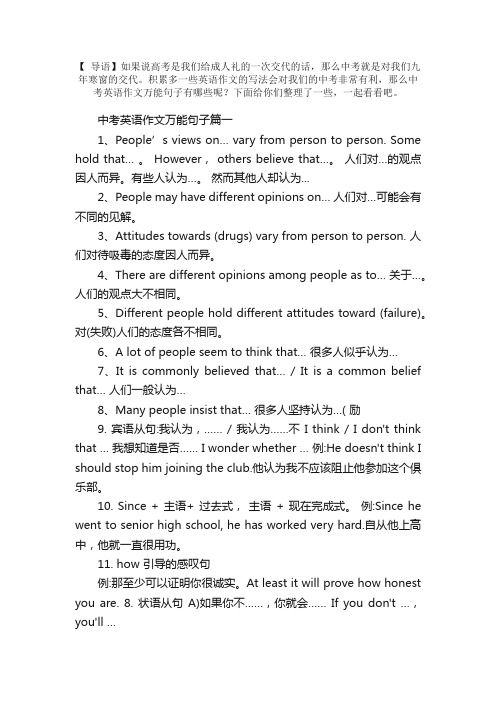
【导语】如果说高考是我们给成人礼的一次交代的话,那么中考就是对我们九年寒窗的交代。
积累多一些英语作文的写法会对我们的中考非常有利,那么中考英语作文万能句子有哪些呢?下面给你们整理了一些,一起看看吧。
中考英语作文万能句子篇一1、People’s views on… vary from person to person. Some hold that… 。
However,others believe that…。
人们对…的观点因人而异。
有些人认为…。
然而其他人却认为...2、People may have different opinions on… 人们对…可能会有不同的见解。
3、Attitudes towards (drugs) vary from person to person. 人们对待吸毒的态度因人而异。
4、There are different opinions among people as to… 关于…。
人们的观点大不相同。
5、Different people hold different attitudes toward (failure)。
对(失败)人们的态度各不相同。
6、A lot of people seem to think that… 很多人似乎认为…7、It is commonly believed that… / It is a common belief that… 人们一般认为…8、Many people insist that… 很多人坚持认为…( 励9. 宾语从句:我认为,…… / 我认为……不 I think / I don't think that … 我想知道是否…… I wonder whether … 例:He doesn't think I should stop him joining the club.他认为我不应该阻止他参加这个俱乐部。
初中英语中考常考句型及例句(共九大类60个)
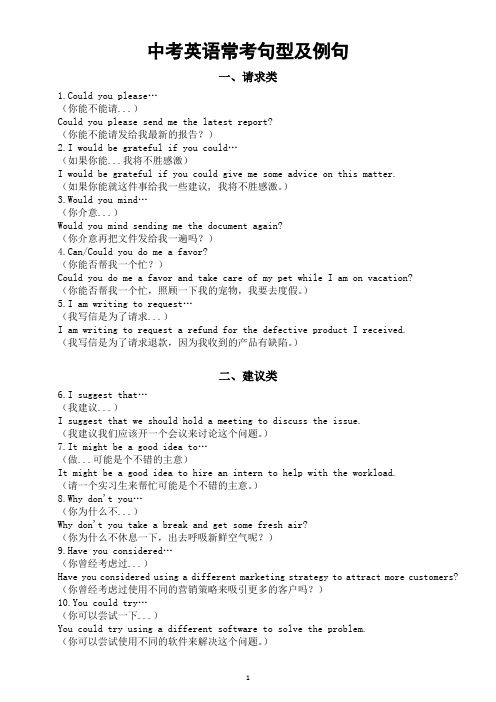
中考英语常考句型及例句一、请求类1.Could you please…(你能不能请...)Could you please send me the latest report?(你能不能请发给我最新的报告?)2.I would be grateful if you could…(如果你能...我将不胜感激)I would be grateful if you could give me some advice on this matter.(如果你能就这件事给我一些建议, 我将不胜感激。
)3.Would you mind…(你介意...)Would you mind sending me the document again?(你介意再把文件发给我一遍吗?)4.Can/Could you do me a favor?(你能否帮我一个忙?)Could you do me a favor and take care of my pet while I am on vacation?(你能否帮我一个忙,照顾一下我的宠物,我要去度假。
)5.I am writing to reque st…(我写信是为了请求...)I am writing to request a refund for the defective product I received.(我写信是为了请求退款,因为我收到的产品有缺陷。
)二、建议类6.I suggest that…(我建议...)I suggest that we should hold a meeting to discuss the issue.(我建议我们应该开一个会议来讨论这个问题。
)7.It might be a good i dea to…(做...可能是个不错的主意)It might be a good idea to hire an intern to help with the workload.(请一个实习生来帮忙可能是个不错的主意。
中考英语作文句型

中考英语作文句型中考英语作文句型11.主语+is + the + 最高级+ 名词+(that)+ I have ever seen (known/heard/had/read)Helen is the most beautiful girl that I have ever seen。
海伦是我所看过最美丽的女孩。
Mr. Chang is the kindest teacher that I have ever had。
张老师是我曾经遇到最仁慈的教师。
Yao Ming is the tallest basketball player that I have ever seen。
姚明是我所见过的最高的篮球运动员Liu Xiang is the most hardworking sportsman that I have ever seen。
刘翔是我所见过的最勤奋的运动员。
2.Nothing is more important + than + to do sth.Nothing is more important than to keep fit。
没有比保持健康更重要的事。
Nothing is more important than to potect our environment。
没有什么比环保更重要的事。
Nothing is more important than to gain knowledge。
没有什么比学习知识更重要的事。
3.There is no denying that + S + V (不可否认的)There is no denying that Nothing is more important than to potectour environment.不可否认的,没有什么比环保更重要的事。
中考英语作文句型21. 6月2日下午,我正乘火车从上海到沈阳回家的途中。
On the afternoon of July 2nd, I was traveling from Shanghai back to Shenyang by train.2.一大早,我们就出发了。
中考英语短语句型大全-必考必背

xx英语短语句型大全It’s time for sth.该到做某事的时间了.It’s time to do sth.(It’s time for sb. to do sth)该到做某事的时间了.2. can’t wait to do sth.迫不及待地要求做某事.3. ask (tell)sb. (not )to do sth .请(告诉)某人(不)做某事.4. make/let / have sb. do sth.让某人做某事.5. hear/see/sb. do sth听见/看见某人做某事.hear/see/sb. doing sth听见/看见某人正在做某事.6. had better(not )do sth最好不做某事.7. It’s better to do sth最好做某事8. It’s best to do sth最好做某事9.enjoy doing喜欢做某事10. finish doing完成某事11. keep doing继续做某事12. keep on doing sth.继续做某事13. carry on doing继续做某事14. go on doing继续做某事15. feel like doing喜欢做某事16. stop to do sth停下来去做某事stop doing sth停下来去做某事(与)停止做某事.17. forget/remember to do与forget/remember doing sth.忘记/记得去做某事(与)忘记/记得曾经做过事.18. keep(prevent,stop)sb. from doing sth阻止/防止/阻栏栽人做某事19. preferA….toB…喜欢…..胜过……20. prefer to do sth. rather than do ath.宁愿做某事,而不原做某事.21. used to do sth.过去常常做某事.Be/get used to doing sth习惯于做某事22. What’s wong with……? …..出了问题(事)?23. have nothing to do with…..与…..无关24. be busy doing sth .在忙于做某事25. too…..to…..太……而不能26. so ……that …..如此…..以至于27. such…..that……如此…..以至于28. It takes/took sb. some time to do sth .某人做某事用了一些时间.29. spend …..on sth.(doing sth.)花钱/时间做某事.30. pay…..for sth.花费(钱)买某物.31. What /how abou t…doing sth…? …….怎么样(好吗)?32. would like to do sth .想要/愿意做某事..33. I don’t think that我认为……不…..34. Why not do sth.? Why don’t you do sth .?为什么不做某事呢?35. What do you mean by….?你….是什么意思?36. What do you think of …..(How do you like ….)你认为….怎么样?37. Mike enjoys collecting stamps . So do I.迈克喜欢集邮.我也也喜欢.38. The more, the better .越多越好.39. Thanks for doing sth.谢谢你做了某事.40. It is said that…..据说…1 (see、hear、notice、find、feel、listen to、lookat (感官动词)+doeg:Ilikewatchingmonkeysjump2(比较级and比较级)表示越来越bigger and bigger越来越大5 all kinds of各种各样a kind of一样6 all over the world = the whole world整个世界7 along with同……一道,伴随…eg : I will go along with you我将和你一起去the students planted trees along with their teachers8 As soon as一怎么样就怎么样9 as you can see你是知道的10 ask for ……求助向…要…(直接接想要的东西)eg :ask you for my book11 ask sb for sth向某人什么13 at the age of在……岁时I am at the age of sixteen14 at the beginning of …………的起初;……的开始15 at the end of +地点/+时间最后;尽头eg : At the end of the day16 at this time of year在每年的这个时候17 be /feel confident of sth /that +从句感觉/对什么有信心,自信eg : I am / feel confident of my spoken EnglishI feel that I can pass the test19 be able to (+ v原) = can (+ v原)能够……eg :She is able to singShe can sing20 be able to do sth能够干什么eg :she is able to sing21 be afraid to do (of sth恐惧,害怕……eg : I'm afraed to go out at nightI'm afraid of doingsth22 be allowed to do被允许做什么eg:I'mallowedtowatchTV我被允许看电视IshouldbeallowedtowatchTV我应该被允许看电视23 be angry with sb生某人的气eg : Don't be angry with me24 be angry with(at) sb for doing sth为什么而生某人的气25 be as…原级…as和什么一样eg : She is as tall as me她和我一样高26 be ashamed to羞愧27 be away from远离28 be away from从……离开29 be bad for对什么有害be good for对什么有好处eg : Reading books in the sun is bad for your eyes在太阳下看书对你的眼睛不好30 be born出生于31 be busy doing sth忙于做什么事be busy with sth忙于…32 be careful当心;小心look out = watch out33 be different from……和什么不一样34 be famous for = be known for以……著名35 be friendly to sb对某人友好36 be from = come from来自37 be full of装满……的be filled with充满eg:the glass is full of waterthe glassis filled with water38 be glad+to+do/从句39 be going to + v(原)将来时40 be good at(+doing) = do well in在某方面善长,善于41eg : Reading aloud is good for your English42 be happy to do很高兴做某事43 be helpful to sb对某人有好处eg : Reading aloud is helpful to you大声朗读对你有好处44 be in good health身体健康45 be in trouble处于困难中eg : She is in trouble46 be interested in对某方面感兴趣47 be late for = come late to迟到 eg: Be late for class上课迟到51 be made of由……制成(制成以后还看得见原材料)be made into被…制成be made in由。
中考英语重点句型(基础、对话和写作)

初中英语重要句型总结其中含有基本句型、对话句型以及写作句型:1:There+be +主语+地点状语/时间状语There's a boat in the river.河里有条船。
There are seven days in a week.一周有七天。
2:What's wrong with+sb./sth.?What's wrong with you?你怎么啦?What's wrong with your watch?你的手表有什么毛病?3:How do you like...?How do you like China?你觉得中国怎么样?4:What do you like about...?What do you like about China?你喜欢中国的什么?5:had better(not)+动词原形You'd better ask that policeman over there.你最好去问问那边的那个警察。
6:How+adj./adv.+主语+谓语!What a/an+adj.+n.+主语+谓语!How cold it is today !今天多冷啊!What a fine picture it is!多美的一幅图画呀!7:Thank+sb.+for(doing)sth.Thank you for coming to see me.感谢你来看我。
8:So+be/情态动词/助动词+主语He is a student.So am I.他是一个学生,我也是。
9:...not...until...He didn't have supper until his parents came back.直到他的父母回来他才吃饭。
10:比较级+and+比较级The baby cried harder and harder.那孩子哭得越来越厉害。
11:the +比较级,the +比较级The more one has,the more one wants.越有越贪。
初中英语重点句型、短语中考教育必背
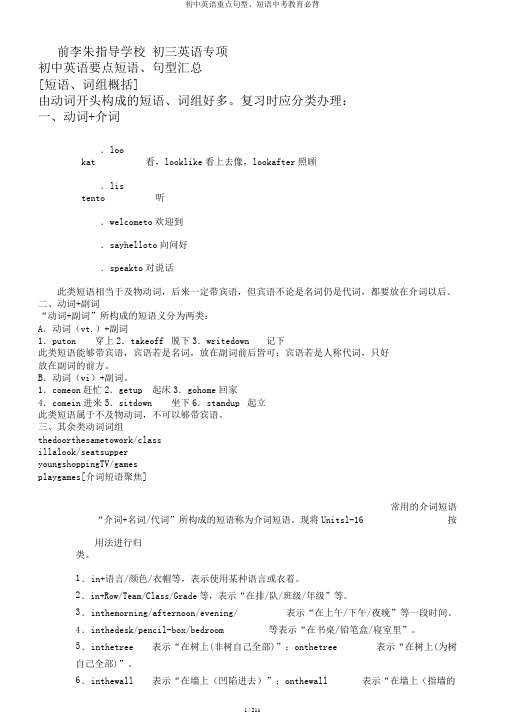
前李朱指导学校初三英语专项初中英语要点短语、句型汇总[短语、词组概括]由动词开头构成的短语、词组好多。
复习时应分类办理:一、动词+介词.lookat看,looklike看上去像,lookafter照顾.listento听.welcometo欢迎到.sayhelloto向问好.speakto对说话此类短语相当于及物动词,后来一定带宾语,但宾语不论是名词仍是代词,都要放在介词以后。
二、动词+副词“动词+副词”所构成的短语义分为两类:A.动词(vt.)+副词1.puton 穿上2.takeoff 脱下3.writedown 记下此类短语能够带宾语,宾语若是名词,放在副词前后皆可;宾语若是人称代词,只好放在副词的前方。
B.动词(vi)+副词。
1.comeon赶忙2.getup 起床3.gohome回家4.comein进来5.sitdown 坐下6.standup 起立此类短语属于不及物动词,不可以够带宾语。
三、其余类动词词组thedoorthesametowork/classillalook/seatsupperyoungshoppingTV/gamesplaygames[介词短语聚焦]“介词+名词/代词”所构成的短语称为介词短语。
现将Unitsl-16常用的介词短语按用法进行归类。
1.in+语言/颜色/衣帽等,表示使用某种语言或衣着。
2.in+Row/Team/Class/Grade等,表示“在排/队/班级/年级”等。
3.inthemorning/afternoon/evening/表示“在上午/下午/夜晚”等一段时间。
4.inthedesk/pencil-box/bedroom等表示“在书桌/铅笔盒/寝室里”。
5.inthetree表示“在树上(非树自己全部)”;onthetree表示“在树上(为树自己全部)”。
6.inthewall表示“在墙上(凹陷进去)”;onthewall表示“在墙上(指墙的1前李朱指导学校初三英语专项表面)”。
中考英语作文万能句型及模板
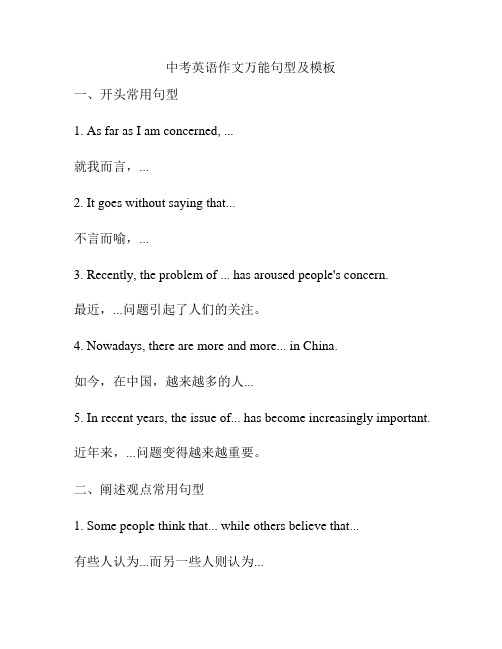
中考英语作文万能句型及模板一、开头常用句型1. As far as I am concerned, ...就我而言,...2. It goes without saying that...不言而喻,...3. Recently, the problem of ... has aroused people's concern.最近,...问题引起了人们的关注。
4. Nowadays, there are more and more... in China.如今,在中国,越来越多的人...5. In recent years, the issue of... has become increasingly important. 近年来,...问题变得越来越重要。
二、阐述观点常用句型1. Some people think that... while others believe that...有些人认为...而另一些人则认为...2. From my point of view, ...在我看来,...3. It is believed that...人们认为,...4. It is true that...确实,...5. It is a common belief that...人们普遍认为...三、列举观点常用句型1. On the one hand, ... On the other hand, ... 一方面,...另一方面,...2. First, ... Second, ... Third, ...首先,...其次,...第三,...3. In addition, ...此外,...4. Moreover, ...而且,...5. Besides, ...另外,...四、表达原因常用句型1. There are several reasons for ... First, ... Second, ... Finally, ... ...的原因有几个:首先,...其次,...最后,...2. One of the main reasons for ... is that......的主要原因之一是...3. There are many factors that may account for ... For one thing, ... For another, ... Perhaps the most important factor is...导致...的因素很多,一方面,...另一方面,...也许最重要的因素是...五、结尾常用句型1. In conclusion, ...总之,...2. To sum up, ...总之,...3. In a word, ...总之,...4. Based on what has been discussed, ...基于以上讨论,...5. All in all, ...总之,...作文模板一、议论文模板(1) 经典三段式结构第一段:引出话题和观点,即对正反两方观点的简要概述第二段:表达自己的观点,并尝试提供论据、证据或者实例以增强说服力第三段:总结,强调自己的观点以及优越性范文:Nowadays, people are involved in a heated debate over the issue of... On the one hand, some people argue that... On the other hand, others hold the opposite view that... As far as I am concerned, I firmly believe that...To begin with, I believe that... Firstly, ... Secondly, ... What's more, ... To illustrate, ... From these examples, ... Therefore, ...In a word, considering all the factors above, I firmly believe that... and it will bring about great benefits to both individuals and society as a whole.二、图表作文模板第一段:描述图表,概括其内容和主题,以及时间范围第二段:分析图表的趋势和变化,提供相关数据和原因第三段:总结图表内容和趋势,并提出自己的观点/建议范文:The chart shows the changes of ... from ... to ... . There are several interesting points worth discussing.As the chart indicates, there has been a steady increase / decrease in the number of ... from ... to ... . In addition, ... accounts for the majority / minority of the total number. When it comes to the reasons behind this phenomenon, there are a number of factors thatmight have contributed, such as ..., ..., or ... . Moreover, ...In conclusion, it is clear that ... has undergone significant changes during the period of ... to ... . And based on these trends, it is suggested that ... .。
[精]中考英语常考的重点句型及短语汇总
![[精]中考英语常考的重点句型及短语汇总](https://img.taocdn.com/s3/m/b7c1f0500c22590103029d51.png)
中考英语常考的重点句型及短语汇总一、重点句型1.So + be/助动词/情态动词/主语.前面陈述的肯定情况也适于另一人(物)时,常用到这种倒装结构,表示“另一人(物)也如此。
”前面陈述的否定情况也适于另一人(物)时,常用“Neither/ Nor + be/助动词/情态动词+主语.”这种倒装结构。
注意:“So+主语+be/助动词/情态动词.”这一句型常用于表示赞同,进一步肯定对方的看法,表示“的确如此。
”“是呀。
”2.Turn right/leftat the first/second/…crossing.这一指路的句型意为“在第一/二/……个十字路口向右/左拐。
”相当于Take the first /second/…turning on theright/left.3.It takes sb.some time to do sth.此句型表示“干某事花了某人一段时间。
”其中的it是形式主语,后面的动词不定式(短语)才是真正的主语.4.…think/find + it + adj. + to do sth.此句型中的it是形式宾语,不可用其它代词替代,形容词作宾语的补足语,后面的动词不定式(短语)才是真正的宾语。
5.What’s wrong with…?此句型相当于What’s the matter/ trouble with…?后跟某物作宾语时,意为“某物出什么毛病了?”后跟某人作宾语时,意为“某人怎么了?”6.too…to…在so…that…复合句中,that后的句子是否定句时,常与简单句too…to…(太……而不能……)进行句型转换。
在so…that…复合句中,that后的句子是肯定句时,常与简单句…enough to…进行句型转换.7.Sorry to hear that.全句应为I’m sorry to hear that. 意为“听到此事我很难过(遗憾)。
”常用于对别人的不幸表示同情、遗憾之意。
英语简单句五种基本句型和三种必考句型总结
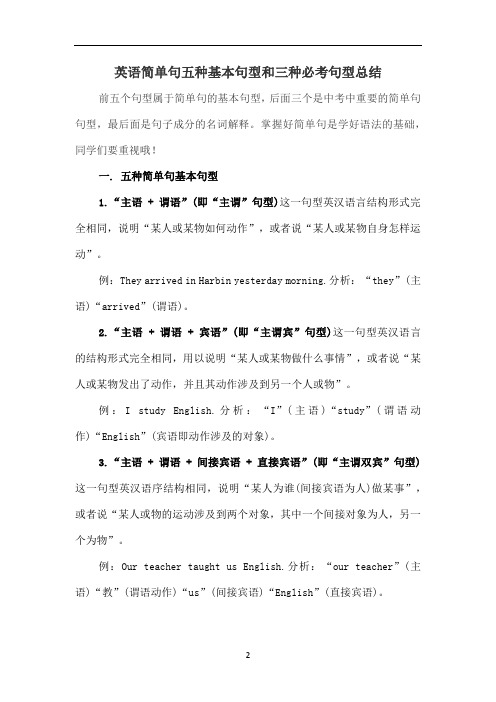
英语简单句五种基本句型和三种必考句型总结前五个句型属于简单句的基本句型,后面三个是中考中重要的简单句句型,最后面是句子成分的名词解释。
掌握好简单句是学好语法的基础,同学们要重视哦!一. 五种简单句基本句型1.“主语 + 谓语”(即“主谓”句型)这一句型英汉语言结构形式完全相同,说明“某人或某物如何动作”,或者说“某人或某物自身怎样运动”。
例:They arrived in Harbin yesterday morning.分析:“they”(主语)“arrived”(谓语)。
2.“主语 + 谓语 + 宾语”(即“主谓宾”句型)这一句型英汉语言的结构形式完全相同,用以说明“某人或某物做什么事情”,或者说“某人或某物发出了动作,并且其动作涉及到另一个人或物”。
例:I study English.分析:“I”(主语)“study”(谓语动作)“English”(宾语即动作涉及的对象)。
3.“主语 + 谓语 + 间接宾语 + 直接宾语”(即“主谓双宾”句型)这一句型英汉语序结构相同,说明“某人为谁(间接宾语为人)做某事”,或者说“某人或物的运动涉及到两个对象,其中一个间接对象为人,另一个为物”。
例:Our teacher taught us English.分析:“our teacher”(主语)“教”(谓语动作)“us”(间接宾语)“English”(直接宾语)。
4.“主语 + 谓语 + 宾语 + 宾语补足语”(即“主谓宾宾补”句型)这一句型说明“某人或某物要求(使、让)某人做什么”或“某人感觉某人或物怎么样”。
例:He asked her to go there.分析:“he”(主语)“asked”(谓语动作)“her”(宾语即动作涉及的对象)“to go there”(补语—补充说明宾语做什么)。
5.“主语 + 系动词+ 表语”(即“主系表”句型)这一句型用以说明“某人(某物、某事、某种概念)具有什么特征或处于什么状态”。
中考英语重要句型总结参考

中考英语重要句型总结参考[短语、词组归纳]由动词开头构成的短语、词组许多。
复习时应分类处理:一、动词+介词1.look at…看…, look like …看上去像……, look after …照料…2.listen to…听……3.welcome to…欢迎到……4.say hello to …向……问好5.speak to…对……说话此类短语相当于及物动词,其后需要带宾语,但宾语无论是名词还是代词,都要放在介词之后。
二、动词+副词“动词+副词”所构成的短语义分为两类:A.动词〔vt.〕+副词1.put on 穿上 2.take off脱下 3.write down记住此类短语可以带宾语,宾语假设是名词,放在副词前后皆可;宾语假设是人称代词,只能放在副词的前面。
B.动词〔vi〕+副词。
1.come on赶快 2.get up起床 3.go home回家4.come in进来 5.sit down坐下 6.stand up起立此类短语属于不及物动词,不能带宾语。
三、其它类动词词组1.close the door2.1ook the same3.go to work/class4.be ill5.have a look/seat6.have supper7.1ook young 8.go shopping 9.watch TV/games10. play games[介词短语聚焦]“介词+名词/代词”所构成的短语称为介词短语。
现将Unitsl-16常用的介词短语按用法进行归类。
1.in+语言/颜色/衣帽等,表示运用某种语言或穿着……。
2.in + Row/ Team/ Class/ Grade等,表示“在……排/队/班级/班级”等。
3.in the morning/ afternoon/ evening/ 表示“在上午/下午/傍晚”等一段时间。
4.in the desk/ pencil-bo*/bedroom 等表示“在书桌/铅笔盒/卧房里”。
中考英语作文常用句型(有例句)

中考英语作文常用句型A.开头常用句型1.It is said that… 从句“据说……〞It is said that Jay Chou will visit our school next week.据说周杰伦下周会参观我们学校。
2.It is reported that… 从句“据报道……〞It is reported that some nuclear radiation from Fukushima of Japan has gone into the sea.据报道,局部日本福岛核辐射已经进入海洋。
3.It is believed that 从句“一般认为……〞It’s believed that eating more fruits and vegetables is good for our health.一般认为多吃水果和蔬菜有助于身体健康。
4.It is necessary (for sb.) to do / that……是必要的It’s necessary for us to learn a foreign language. 学习一门外语对我们来说是很有必要的。
5.It is important/essential (for sb.) to do / that…… 是重要的As we know, it is important for us to master a foreign language.众所周知,掌握一门外语是非常重要的。
6.It is proper (for sb.) to do / that …… 是适当的It is proper that we (should) keep the public places clean. 我们应当保持公共场所清洁。
7.It is urgent (for sb.) to do / that ……是紧急的It’s urgent for us to protect the environment now.现在对我们来说保护环境是非常紧迫的。
- 1、下载文档前请自行甄别文档内容的完整性,平台不提供额外的编辑、内容补充、找答案等附加服务。
- 2、"仅部分预览"的文档,不可在线预览部分如存在完整性等问题,可反馈申请退款(可完整预览的文档不适用该条件!)。
- 3、如文档侵犯您的权益,请联系客服反馈,我们会尽快为您处理(人工客服工作时间:9:00-18:30)。
2月4日干货资料-一些常考概念及辨析—橙子(小蔡)(欢迎补充):来源:网络&课本&群内问答1.时间介词用法:at 确切的时刻(0:00)at10o’clock,at four thirty用餐时间at lunchtime,at coffee time,at dinner time节日at Christmas,at Halloween年龄at16,at the age of35其它时刻at noon,at night,at midnight,at the weekendon具体到以“天”计“的时间on Sunday,on Friday afternoon,on October4th,on your birthday,on Christmas Day,on that evening, on the evening of July1st,on a cold morningin 泛指一天中的某个时段in the morning,in the afternoon,in the evening 月份、年份、季节、世纪in May,in winter,in2005,in the21st c entury,一段时间in five minutes,in ten days,in three weeks,2.方位介词(Prepositions of place)1)常用的方位介词(词组)成反义词:above---below,over---under,inside---outside,in front of---behind有关联的:above---over---on,below---under,beside---next to,at---in,between---among其他:opposite2)使用时的注意点A.方位介词在句子中的位置The book is under the desk.(be动词的后面)He is standing between the two trees.(实义动词的后面)Do you know the man in front of the classroom?(放在名词后面修饰它)He lives in an old house in the center of the city.(作为整句话的状语)B.above和below,over和under这两组反义词的前者都表示“在上方”,后者都表示“在下方”。
There are some bridges over the river.What’s under the bed?An old shoe.The shelf is above the top bunk bed.She lives two floors below Linda.C.above,over和on这三个词都表示“在上面”,on是指和物体有接触,over是指在正上方,没有接触面,above也是没有接触面,正上方或斜上方,但现在可代替over,如:The wooden house is over/above the river.The bag is on the table.There is a plane flying above our heads.D.at和in这两个词常用在arrive后面,at后加小地点,in后加大地点,如:He arrived at the airport at4p.m.We will arrive in Beijing tomorrow morning.E.between和amongbetween是指在两者之间,常用词组between…and…,而among是在三者或三者以上之间,如:I sit between Lily and Lucy.Mr.Li likes staying among his students.(注:英语中的复数名词,没有特别指出是两个,都默认为三者或三者以上)F.opposite:在对面如:Our school is opposite a park..3.基数词(Cardinal numbers)表示数目的数词是基数词。
1)基数词的构成A.两位数:十位数与个位数之间加连字符。
如:23twenty-threeB.三位数:百位数与最后两位数加and(美语省略and)。
如:201two hundred and one642six hundred and forty-twoC.四位数:thousand之后加逗号,后面依照以上原则。
如:1,351one thousand,three hundred and fifty-oneD.表示万以上的数目,将数字由右向左每三位加一个逗号,使一个数字分成几个小节,称为thousand节,million节等,然后按节处理,如:68,343sixty-eight thousand,three hundred and forty-three13,526,300thirteen million,five hundred twenty-six thousand,three hundred▲英语中没有直接的单词来表示“万”和“亿”,如:一万10,000ten thousand两万20,000twenty thousand十万100,000one hundred thousand三十万300,000three hundred thousand一千万10,000,000ten million两千万20,000,000twenty million一亿100,000,000one hundred million▲表示十亿,美国用one billion,英国用one thousand million2)基数词的运用A.表示确切数目时,hundred,thousand和million只能用单数,不能变复数;但表示不确定的数目时,要用复数形式。
如:five hundred五百three thousand三千hundred s of成百上千的thousand s of成千上万的million s of数百万的B.表示时间:7:30seven thirtyC.表示年代:in the1980s(读作nineteen eight ies)在二十世纪八十年代2005(读作two thousand and five)D.表示不确定的年龄:in his twent ies在他二十几岁时4.序数词(Ordinal numbers)表示人或物的顺序的数词是序数词。
1)序数词的构成一二三,特殊记,(first,second,third)加th从四起;(从四开始所有的序数词都是以th结尾的。
)八少t,九少e;(eight去t加th变成eighth,nine去e加上th变成ninth)逢五与十二,f替ve;(five,twelve中ve变为f再加th,就成为fifth,twelfth)二十到九十,y变ie;(20~90等十位整数的基数词都是以y结尾的,变成序数词时要变y为ie,再加th。
例如:twentieth,thirtieth等。
)若是几十几,前基后序要牢记。
(这些词的序数词写法是:十位数保持基数词不变,个位数改成序数词,如:twenty-first,ninety-fifth.)▲百位数的序数词:百位数用基数词+后面十位数或个位数的序数词,如:第二百二十two hundred and twentieth第二百零三two hundred and third▲序数词的缩写形式由阿拉伯数字加序数词的最后两个字母构成,如:two hundred and twentieth---220th two hundred and third---203rd▲第九nin th十九nine teen第十九nine teenth九十nine ty第九十nine tieth第四four th十四four teen第十四four teenth四十for ty第四十for tieth2)序数词的用法A.表示日期,如:March18th,1978或18th March,1978B.表示编号或顺序,如:the sixth lesson=Lesson SixC.前面一般加定冠词the,如:He is the first student to get to the school every day.▲如果序数词前面有形容词性物主代词,可以不加the,如:It was his fifth bowl of rice for lunch.D.有时还可以作副词用,如:I finished the homework first in my class today.5.No和None的用法1)noA.no表示“没有”,作为形容词时后面接名词(可数和不可数),相当于not…any或not…a,如:I have no brothers.=I do not have any brothers.There is no student in the classroom.=There is not a student in the classroom.I drank no water this morning.=I did not drink any water this morning.B.还可以用来回答一般疑问句,如:Did you have lunch?No,I didn’t.2)none表示“没有人”或“没有东西”,后面不能接名词,可以作为可数或不可数。
如:---How many chips are there in the packet?---There are none.---how much orange juice do you have?---We have none.6.定冠词The1)指上文所提到过的人或物,如:I have a cat.The cat is white.2)指世界上独一无二的事物,如:the capital of China,the sun3)用于序数词,方位名词和最高级的前面,如:the second,in the north,the best game4)用于乐器前面,如:play the piano5)用于一些形容词的前面,表示一类人,如:the old老人,the rich富人7.感叹句(Expressions with‘What’and‘How’)用以表示喜怒哀乐等强烈感情的句子叫做感叹句。
句末常用感叹号,一般读作降调。
通常由感叹词what 或how构成,将what或how置于句首,后面跟它所修饰的词,即构成感叹句。
